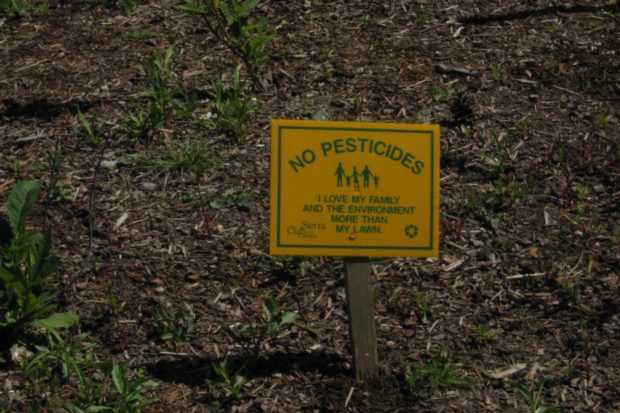
By Angel Garcia and Nayamin Martinez
On Aug. 9, a federal judge at the Ninth Circuit Court of Appeals ordered the U.S. Environmental Protection Agency (EPA) to adopt a nationwide ban of the brain-harming pesticide chlorpyrifos. Why is this ruling so important for the San Joaquin Valley? Because Kern, Fresno and Tulare counties have the highest use of this pesticide.
California uses more chlorpyrifos than any other state in the nation, with more than 900,000 pounds used in 2016, on about 80 crops, including citrus, nuts, apples, broccoli and dozens of other crops. Every crop for which chlorpyrifos is used in California is also grown organically in the state.
The U.S. EPA has known for years the damage that exposure to chlorpyrifos could cause, effectively banning the pesticide for all residential use in 2001 because of harm to children. In addition to causing irreversible brain damage, chlorpyrifos has been linked to a number of other permanent and serious health harms in children, including the increased likelihood of developing autism, ADHD and worsening or triggering asthma.
Two years ago, U.S. EPA scientists found no safe use for chlorpyrifos in agriculture and recommended an effective ban for the nation. The Trump Administration, however, rejected its own scientists’ conclusions and refused to end chlorpyrifos use in the fields.
In California, the Department of Pesticide Regulation (DPR) took an approach similar to former U.S. EPA Administrator Scott Pruitt: more studies, no ban and continued exposure. Nevertheless, recent developments continue to further the evidence that chlorpyrifos is a neurotoxic and that there is no safe use for this pesticide up to half a mile.
Last year, the Office of Environmental Health Hazards Assessment listed chlorpyrifos as a Prop 65 reproductive toxicant, and both U.S. Senators from California and the state Attorney General have called for a ban on chlorpyrifos.
Furthermore, the independent Scientific Review Panel, convened by the DPR since December 2017 to study the danger of chlorpyrifos, confirmed at a hearing held on June 12 in Sacramento that the chemical is a toxic air contaminant (TAC). TACs are air pollutants that could cause or contribute to an increase in mortality and in serious illness, or which might pose a hazard to human health.
Under orders from the Scientific Review Panel, the DPR revised its chlorpyrifos risk assessment to show significant risk to infants and children exposed to chlorpyrifos applied as far as one-half mile (2,608 feet) away, as well as from food residues and water contamination.
“Just outside the windows of my family’s home, I hear the airblasters at night,” said Leticia Lopez of Porterville. “I’d like to invite DPR Director [Brian] Leahy to come stay at my house to understand the impact his inaction is having on our communities even after we are away from work.”
“[The] DPR should listen to its own scientists and immediately suspend the use of chlorpyrifos in California,” said Angel Garcia, chair of the Tulare County Coalition Advocating for Pesticide Safety. Every day that this pesticide is used puts another family’s child at risk of permanent brain damage and lowered IQ. If the officials who made these decisions lived where we live, they would have already taken action.”
“With everything we now know, it’s morally reprehensible that this toxic chemical is still being used on food crops in California,” said Nayamin Martinez, director of the Central California Environmental Justice Network. “We were hoping California would be the first state to step up to protect its residents, but Hawaii instituted the first state ban earlier this year. The United Kingdom has banned all uses of chlorpyrifos, except on broccoli starts, since 2016. What more does California need to take action?”
*****
Angel Garcia is the Tulare County community organizer for Californians for Pesticide Reform (CPR) and co-founder of the Coalition for Pesticide Safety (CASP). Contact her at angel@pesticidereform.org. Nayamin Martinez is the director of the Central California Environmental Justice Network (CCEJN) and a Steering Committee member of Californians for Pesticide Reform (CPR). Contact her at nayamin.martinez@outlook.com.

[…] shouldn’t even be discussing the dangers of brain-harming chlorpyrifos, but the Trump administration has twice stopped it from being banned in the United States. The […]